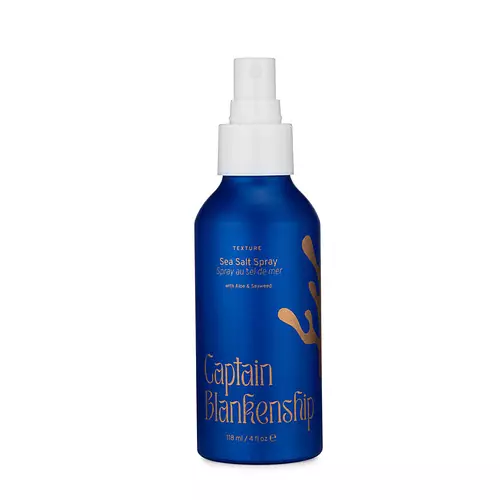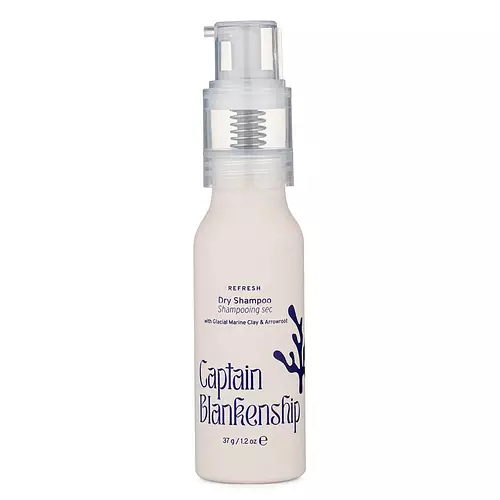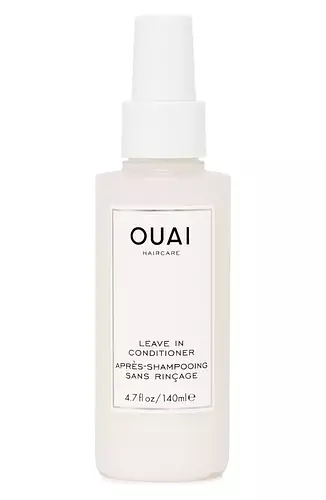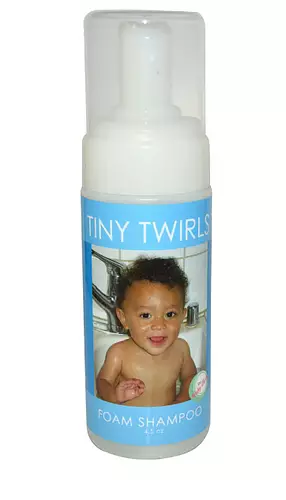Captain Blankenship Cleanse Shampoo with Aloe & Seaweed Ingredients Explained
Published on June 19, 2023 Submitted by nenepy9a
Overview
What it is
Shampoo with 31 ingredients that contains AHA, BHA and exfoliants
Cool Features
It is cruelty-free and reef safe
Suited For
It has ingredients that are good for dry skin, brightening skin, sensitive skin, reducing pores, scar healing and better texture
Free From
It doesn't contain any harsh alcohols, common allergens, parabens or silicones
Fun facts
Captain Blankenship is from United States.
We independently verify ingredients and our claims are backed by peer-reviewed research. Does this product need an update? Let us know.
Shampoo with 31 ingredients that contains AHA, BHA and exfoliants
Quick info
You should know
Notable Ingredients
This product contains 1 ingredient that may have this attribute:
This product contains 1 ingredient that may have this attribute:
This product contains 1 ingredient that may have this attribute:
Benefits
This product contains 2 ingredients that may have this attribute:
This product contains 1 ingredient that may have this attribute:
This product contains 1 ingredient that may have this attribute:
This product contains 1 ingredient that may have this attribute:
This product contains 1 ingredient that may have this attribute:
This product contains 1 ingredient that may have this attribute:
This product contains 2 ingredients that may have this attribute:
Concerns
This product contains 1 ingredient that may have this attribute:
This product contains 1 ingredient that may have this attribute:
This product contains 2 ingredients that may have this attribute:
This product contains 3 ingredients that may have this attribute:
This product contains 1 ingredient that may have this attribute:
Ingredients 31
Aloe Barbadensis Leaf Juice comes from leaves of the aloe plant. Aloe Barbadensis Leaf Juice is best known for helping to soothe sunburns. It is also anti-inflammatory, moisturizing, antiseptic, and can help heal wounds.
Water. It's the most common cosmetic ingredient of all. You'll usually see it at the top of ingredient lists, meaning that it makes up the largest part of the product.
Sodium Cocoyl Glutamate is a gentle cleanser and surfactant. It is the sodium salt of the Cocoyl Glutamic Acid and comes from coconut oil. As a surfactant, it helps lift dirt and oil to be washed away.
Decyl Glucoside is a glucose-based surfactant. Surfactants help clean the skin by trapping oil, sebum, and dirt to be washed away.
Glycerin is already naturally found in your skin. It helps moisturize and protect your skin.
Citric Acid is an AHA derived from citrus fruits (think oranges, lemons, and limes!).
Lauryl Glucoside sugar- and lipid-based cleansing agent. It is created from glucose and lauryl alcohol.
Coco-Glucoside is a surfactant, or a cleansing ingredient. It is made from glucose and coconut oil.
Glyceryl Oleate is a fragrance and isn't fungal acne safe.
Laminaria Digitata Extract comes from the dark brown seaweed, Laminaria Digitata. It is a potent antioxidant, which also provides soothing and hydrating benefits.
Fucus Vesiculosus Extract is derived from a type of brown algae.
Ascophyllum Nodosum Extract is from brown seaweed that grows in the northern Atlantic Ocean. It is an antioxidant. Antioxidants help fight off free-radicals. Free-radicals are molecules that may damage our skin cells.
Carrageenan comes from red seaweed or algae. It is made up of polysaccharides and a highly flexible compound. Red algae cell walls are rich in carrageenan.
Citrus Aurantium Dulcis Peel Oil is oil from the peel of an orange fruit.
Rosmarinus Officinalis Leaf Extract comes from rosemary. Rosemary is native to the Mediterranean.
Xanthan gum is used as a stabilizer and thickener within cosmetic products. It helps give products a sticky, thick feeling - preventing them from being too runny.
Babassu Oil Polyglyceryl-4 Esters is an oil and isn't fungal acne safe.
Sodium levulinate is the a sodium salt of Levulinic Acid. If dissolved in an aqueous solution, the two ingredients become identical.
Sea Salt is an exfoliant. It can be bad for dry skin, cause irritation, worsen eczema, and worsen rosacea.
Polyglyceryl-10 Laurate is an ester of lauric acid and Polyglycerin-10.
Caprylyl/Capryl Glucoside is an alkyl glucoside. This just means it is creating by reacting alcohol and sugar. It is a cleansing and foaming ingredient.
Sodium Phytate is the synthetic salt form of phytic acid. Phytic acid is an antioxidant and can be found in plant seeds.
Magnesium Sulfate is a salt. It can be naturally found in sea water or mineral deposits.
This ingredient is the sodium salt of salicylic acid, the famous anti-acne ingredient.
Sodium Anisate comes from fennel. It is used as a preservative and to add flavoring.
Aloe Barbadensis Leaf Juice, Water, Sodium Cocoyl Glutamate, Decyl Glucoside, Glycerin, Sodium Lauryl Glucose Carboxylate, Citric Acid, Lauryl Glucoside, Coco-Glucoside, Glyceryl Oleate, Laminaria Digitata Extract, Fucus Vesiculosus Extract, Ascophyllum Nodosum Extract, Porphyra Umbilicalis Extract, Alaria Esculenta Extract, Carrageenan, Citrus Aurantium Dulcis Peel Oil, Citrus Aurantifolia Oil, Cymbopogon Flexuosus Oil, Rosmarinus Officinalis Leaf Extract, Xanthan Gum, Babassu Oil Polyglyceryl-4 Esters, Sodium Levulinate, Sea Salt, Polyglyceryl-10 Laurate, Polyglyceryl-10 Oleate, Caprylyl/Capryl Glucoside, Sodium Phytate, Magnesium Sulfate, Sodium Salicylate, Sodium Anisate
Ingredient Ratings
Based on the number of likes and dislikes each ingredient has received.
Ingredients Explained
Aloe Barbadensis Leaf Juice comes from leaves of the aloe plant. Aloe Barbadensis Leaf Juice is best known for helping to soothe sunburns. It is also anti-inflammatory, moisturizing, antiseptic, and can help heal wounds.
Aloe is packed with good stuff including Vitamins A, C, and E. These vitamins are antioxidants, which help fight free-radicals and the damage they may cause. Free-radicals are molecules that may damage your skin cells, such as pollution.
Aloe Barbadensis Leaf Juice also contains sugars. These sugars come in the form of monosaccharides and polysaccharides, folic acid, and choline. These sugars are able to help bind moisture to skin.
It also contains minerals such as calcium, 12 anthraquinones, fatty acids, amino acids, and Vitamin B12.
Learn more about Aloe Barbadensis Leaf JuiceWater. It's the most common cosmetic ingredient of all. You'll usually see it at the top of ingredient lists, meaning that it makes up the largest part of the product.
So why is it so popular? Water most often acts as a solvent - this means that it helps dissolve other ingredients into the formulation.
You'll also recognize water as that liquid we all need to stay alive. Talk about multi-purpose! If you see this, drink a glass of water. Stay hydrated!
Learn more about WaterSodium Cocoyl Glutamate is a gentle cleanser and surfactant. It is the sodium salt of the Cocoyl Glutamic Acid and comes from coconut oil. As a surfactant, it helps lift dirt and oil to be washed away.
Sodium Cocoyl Glutamate also has an emolliating effect and can help leave the skin feeling soft.
Decyl Glucoside is a glucose-based surfactant. Surfactants help clean the skin by trapping oil, sebum, and dirt to be washed away.
It is created by reacting glucose with the fatty acids from plants.
Decyl Glucoside also helps stabilize the ingredients in a product by preventing them from separating.
This ingredient is biodegradable and non-toxic. This ingredient is commonly found in baby shampoos.
Decyl Glucoside is sometimes used to stabilize the UV filter Tinosorb.
Learn more about Decyl GlucosideGlycerin is already naturally found in your skin. It helps moisturize and protect your skin.
A study from 2016 found glycerin to be more effective as a humectant than AHAs and hyaluronic acid.
As a humectant, it helps the skin stay hydrated by pulling moisture to your skin. The low molecular weight of glycerin allows it to pull moisture into the deeper layers of your skin.
Hydrated skin improves your skin barrier; Your skin barrier helps protect against irritants and bacteria.
Glycerin has also been found to have antimicrobial and antiviral properties. Due to these properties, glycerin is often used in wound and burn treatments.
In cosmetics, glycerin is usually derived from plants such as soybean or palm. However, it can also be sourced from animals, such as tallow or animal fat.
This ingredient is organic, colorless, odorless, and non-toxic.
Glycerin is the name for this ingredient in American English. British English uses Glycerol/Glycerine.
Learn more about GlycerinWe don't have a description for Sodium Lauryl Glucose Carboxylate.
Citric Acid is an AHA derived from citrus fruits (think oranges, lemons, and limes!).
If you spot Citric Acid near the end of an ingredient list, it's likely there as a pH adjuster rather than an active ingredient.
As an AHA, Citric Acid removes the top layer of skin cells from the newer layer of skin underneath. This helps skin to remove dark spots and look more even.
Read more about some other popular AHA's here:
Learn more about Citric AcidLauryl Glucoside sugar- and lipid-based cleansing agent. It is created from glucose and lauryl alcohol.
Lauryl Glucoside makes it easier to rinse oil, dirt, and other polluants away.
A British study found lauryl glucoside to cause skin sensitivity for some people. We recommend speaking with a professional if you have concerns.
Learn more about Lauryl GlucosideCoco-Glucoside is a surfactant, or a cleansing ingredient. It is made from glucose and coconut oil.
Surfactants help gather dirt, oil, and other pollutants from your skin to be rinsed away. Coco-Glucoside is considered gentle and non-comedogenic.
This ingredient is a known skin-irritant.
Learn more about Coco-GlucosideGlyceryl Oleate is a fragrance and isn't fungal acne safe.
Laminaria Digitata Extract comes from the dark brown seaweed, Laminaria Digitata. It is a potent antioxidant, which also provides soothing and hydrating benefits.
Many studies show the antioxidant components of Laminaria Digitata to help with anti-inflammation.
Laminaria Digitata contains amino acids, proteins, sugars, and vitamins. Small amounts of minerals such as phosphorous, iron, potassium, and copper are also found the seaweed. These components help hydrate and nourish your skin's natural barrier. Having a healthy skin barrier leads to more youthful looking skin and may help reduce the signs of aging.
Laminaria Digitata is found in the northern Atlantic Ocean.
Learn more about Laminaria Digitata ExtractFucus Vesiculosus Extract is derived from a type of brown algae.
Algae is an informal term for a group of aquatic organisms that can photosynthesize. It is estimated there are at least 30,000 types of Algae.
Fucus Vesiculosus Extract contains antioxidants. Antioxidants help fight free-radicals. Free-radicals are molecules that may damage your skin cells, such as pollution.
Fucus Vesiculosus Extract is also rich in sodium, potassium, and amino acids.
Many different types of algae have different benefits.
Learn more about Fucus Vesiculosus ExtractAscophyllum Nodosum Extract is from brown seaweed that grows in the northern Atlantic Ocean. It is an antioxidant. Antioxidants help fight off free-radicals. Free-radicals are molecules that may damage our skin cells.
Ascophyllum Nodosum Extract is also used to enhance the texture of products.
We don't have a description for Porphyra Umbilicalis Extract.
Alaria Esculenta Extract is derived from a brown seaweed called badderlocks.
Alaria Esculenta Extract has antioxidant and hydrating properties.
Carrageenan comes from red seaweed or algae. It is made up of polysaccharides and a highly flexible compound. Red algae cell walls are rich in carrageenan.
In cosmetics, it helps to thicken the texture. Studies show carrageenan extracted from red algae possess antioxidant properties. Components found in carrageenan include: lipids, fatty acids, Vitamin E, proteins, and several amino acids.
Learn more about different types of algae.
Carrageenan is also commonly used in medicine and food. It is a vegan alternative to animal-based gelatin.
Learn more about CarrageenanCitrus Aurantium Dulcis Peel Oil is oil from the peel of an orange fruit.
Limonene and linalool make up the majority of oils from citrus peels. Limonene has a "citrus" fragrance. Citrus peels also contain flavonoids, which have anti-inflammatory properties.
Citrus peel is also a rich source of flavonoids. Flavonoids are natural antioxidants and help protect your skin against damage. Flavonoids are a group of compounds naturally found in vegetables and fruits.
The term 'fragrance' is not regulated in many countries. In many cases, it is up to the brand to define this term. For instance, many brands choose to label themselves as "fragrance-free" because they are not using synthetic fragrances. However, their products may still contain ingredients such as essential oils that are considered a fragrance.
Learn more about Citrus Aurantium Dulcis Peel OilCitrus Aurantifolia Oil is a fragrance and is an oil.
Cymbopogon Flexuosus Oil is an oil.
Rosmarinus Officinalis Leaf Extract comes from rosemary. Rosemary is native to the Mediterranean.
While Rosmarinus Officinalis Leaf Oil can be volatile due to its fragrant properties, this component is usually removed in the leaf extract.
Rosemary Leaf Extract can help protect your skin against damage from free-radical molecules. It contains many antioxidants such as rosmarinic acid and caffeic acid. Rosemarinic acid has been found to help soothe skin conditions such as eczema and acne.
Learn more about Rosmarinus Officinalis Leaf ExtractXanthan gum is used as a stabilizer and thickener within cosmetic products. It helps give products a sticky, thick feeling - preventing them from being too runny.
On the technical side of things, xanthan gum is a polysaccharide - a combination consisting of multiple sugar molecules bonded together.
Xanthan gum is a pretty common and great ingredient. It is a natural, non-toxic, non-irritating ingredient that is also commonly used in food products.
Learn more about Xanthan GumBabassu Oil Polyglyceryl-4 Esters is an oil and isn't fungal acne safe.
Sodium levulinate is the a sodium salt of Levulinic Acid. If dissolved in an aqueous solution, the two ingredients become identical.
It is a skin conditioning agent, meaning it helps soften and hydrate your skin.
According to Cosmetic Ingredient Review, the highest amounts of sodium levulinate are found in mouthwashes at 0.62%.
Learn more about Sodium LevulinateSea Salt is an exfoliant. It can be bad for dry skin, cause irritation, worsen eczema, and worsen rosacea.
Polyglyceryl-10 Laurate is an ester of lauric acid and Polyglycerin-10.
Polyglyceryl-10 Laurate is a cleansing agent and emulsifier. It helps gather dirt, oil, and other pollutants to be rinsed away. As an emulsifier, it helps prevent ingredients from separating, such as oil and water.
Polyglyceryl-10 Laurate may not be fungal acne safe.
Learn more about Polyglyceryl-10 LauratePolyglyceryl-10 Oleate isn't fungal acne safe.
Caprylyl/Capryl Glucoside is an alkyl glucoside. This just means it is creating by reacting alcohol and sugar. It is a cleansing and foaming ingredient.
Caprylyl/Capryl Glucoside helps remove the dirt, oil, and other pollutants from your skin.
Sodium Phytate is the synthetic salt form of phytic acid. Phytic acid is an antioxidant and can be found in plant seeds.
Sodium Phytate is a chelating agent. Chelating agents help prevent metals from binding to water. This helps stabilize the ingredients and the product.
Magnesium Sulfate is a salt. It can be naturally found in sea water or mineral deposits.
In cosmetics, Magnesium Sulfate is used to thicken a product or help dilute other solids. It is a non-reactive and non-irritating ingredient.
You might recognize Magnesium Sulfate as epsom salt, or the bath salt used to help relieve muscle aches.
One study shows magnesium deficiency may lead to inflammation of the skin. Applying magnesium topically may help reduce inflammation.
Learn more about Magnesium SulfateThis ingredient is the sodium salt of salicylic acid, the famous anti-acne ingredient.
Officially, this ingredient is used as a preservative. However, some studies found Sodium Salicylate to have exfoliating properties. Further studies are needed.
Sodium Anisate comes from fennel. It is used as a preservative and to add flavoring.
Sodium Anisate has antimicrobial properties.
More Captain Blankenship Products
See all Captain Blankenship productsMore Shampoos
See all shampoosWe're dedicated to providing you with the most up-to-date and science-backed ingredient info out there.
The data we've presented on this page has been verified by a member of the SkinSort Team.
Read more about us




